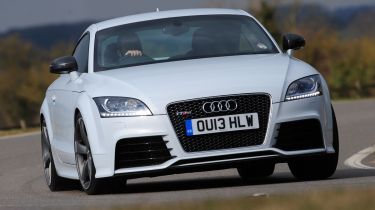Audi TT RS (2009-2016) review
The classy Audi TT coupe is turned into a mini supercar thanks to a turbocharged five-cylinder engine

The Audi TT RS comes in both coupe and roadster bodystyles, and is Audi's answer to the Porsche Cayman and Boxster. It's powered by an incredible 335bhp 2.5-litre five-cylinder turbocharged engine which drives all four wheels through a six-speed manual or S tronic twin-clutch auto. And if you want togo even faster, there's the TT RS plus, which has more power and is capable of 0-60mph in four seconds. Like all fast Audis, it's dominated by its engine, and it's brilliant at getting you to your destination quickly and with minimum fuss – but it's ultimately not that much fun, and the stiff ride is very tiring. We think the standard TT is a more entertaining proposition, and you'll have much more of a laugh in a similarly priced Porsche.
Our choice: TT RS Coupe S tronic
Engines, performance and drive
The Audi TT RS is totally dominated by its 335bhp 2.5-litre five-cylinder turbocharged engine. It provides incredible acceleration – 0-62mph in 4.6 seconds and a 155mph top speed – and an addictive soundtrack. The engine fires up with a bark from the twin exhausts and feels very flexible, with lots of low-down torque and neck-snapping top-end rush all the way to 6,700rpm. Overlay that with a lovely offbeat warble, and you'll think you're at the wheel of one of Audi's legendary rally cars. Sadly, the chassis has fewer strings to its bow. It's got lots of grip, but there's not much feel to the steering and the four-wheel drive transmission feels heavy, so the TT RS isn't very agile or involving. There's a Sport button which sharpens suspension, steering and throttle response, and opens the exhaust for an even greater aural thrill, but a Porsche Cayman tells you much more about what's happening at the front tyres. The Cayman manages to ride much more smoothly too.
MPG, CO2 and Running Costs
Take it easy with the throttle, and you can expect to get more than 30mpg from the TT RS – although if you start to use its considerable performance, economy will drop dramatically. Of the two transmissions, the S tronic automatic is more efficient than the six-speed manual (33.2mpg versus 31.4mpg) and it's easier to live with, too. As for emissions, the manual posts a whopping 209g/km while the auto records 197g/km, so both are pricey to tax. Servicing, tyres and insurance will be expensive. The TT RS is desirable on the second hand market as it's relatively rare, but cars will still shed at least £15,000 of value in three years.
Interior, design and technology
The second-generation Audi TT is a stylish machine, and the RS version adds some extra muscle, with R8-style front air intakes, a pumped-up bodykit, 18-inch alloys and a dramatic fixed rear spoiler. The latter can be swapped for a more subtle pop-up affair if you'd prefer. but whichever you choose, the RS is a lot more in-your-face than the elegant standard car. Inside, the sports seats are clad in Silk Nappa leather, there are aluminium pedals and a chunky flat-bottomed steering wheel with RS badging.
Practicality, comfort and boot space
Buy the TT RS Coupe and you'll have a big advantage over the Roadster in terms of practicality – two rear seats. The drop-top is strictly a two-seater, and while the Coupe is hardly what you'd call spacious, it does have a pair of rear seats for emergencies. You can squeeze a couple of very small adults in there, but they won't be happy about it. As for boot space, there's a decent 290-litre boot – about the same as a VW Scirocco. The rear seats fold down to create a very handy 700-litre boot.
Reliability and Safety
The Audi TT RS, like any TT, is certainly very safe. As standard it comes with stability control, a host of airbags (including side airbags) and, of course, four-wheel drive with stability control. Quality is brilliant throughout and we'd expect reliability to be the same, too. The TT is one of the few sports cars to make it to our Driver Power Top 100, and owners praise it reliability, although some of the newer technology has proved troublesome.







